K-State Current
K-State Current - April 13, 2022
K-State Current is a weekly news update for the Kansas Board of Regents to apprise the Regents on a few of the many successes and achievements made by K-State faculty, staff, and students.

K-State News
Technology Development Institute's Innovation Stimulus Program assists Kansas chiropractic table manufacturer
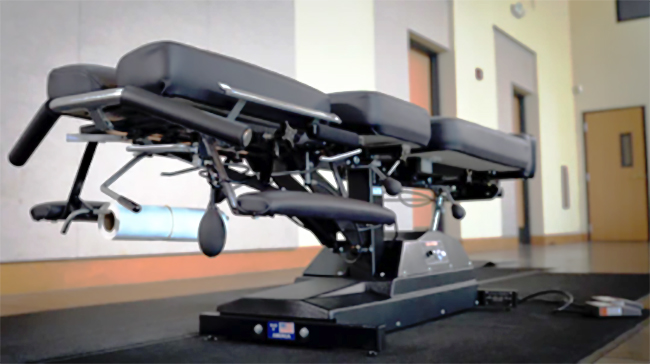 Leander Chiropractic Tables benefit from engineering support provided by Kansas State University's Technology Development Institute.
Leander Chiropractic Tables benefit from engineering support provided by Kansas State University's Technology Development Institute.
Engineering assistance provided by the Technology Development Institute, or TDI, in the Kansas State University Carl R. Ice College of Engineering has helped a Lawrence-based manufacturer of chiropractic tables improve quality and reduce costs.
Leander LLC manufactures a line of chiropractic tables that are sold around the world and are designed with both patient and practitioner comfort in mind. The company, which started in the Pacific Northwest in the 1980s, eventually moved to Lawrence, where it has recently transitioned into a new production facility.
Leander requested assistance from TDI through the Economic Development Administration's grant-funded Innovation Stimulus Program to develop new 3D computer-aided design models of the existing products and to evaluate combining some individual parts into larger one-piece assemblies to reduce part count and increase production efficiency.
One unique aspect of the company's products is that all parts used to fabricate the tables are sourced locally and are supplied by vendors in Kansas or Missouri.
"We are always excited to work with local manufacturers, especially those who purchase many of their parts from other local fabricators," said Bret Lanz, commercialization director at TDI. "When we looked to redesign some of the assemblies, we kept in mind other local suppliers' capabilities and designed the parts in such a way that several individual parts could be incorporated into a single laser-cut part provided by one of their existing suppliers."
"The team at TDI helped us to resolve a number of challenges that we have faced with our production systems and we look forward to a continued relationship with them as we strive to improve the quality and reduce the costs of our tables," said Greg Summers, owner of Leander. "With all of the trouble we've faced throughout the pandemic, having these drawings to get the parts manufactured accurately and efficiently, in addition to being able to use the pictures for standard operating procedures, service training materials and even operation manuals — it's been incredible."
The K-State Technology Development Institute, a U.S. Department of Commerce Economic Development Administration University Center, provides a broad range of engineering and business development services to both private industry and university researchers to advance the commercial readiness of new products or technologies. Additional information is available at k-state.edu/tdi.
K-State Faculty Highlights
Leadership communication team contributes to book on empathy, equity in higher education
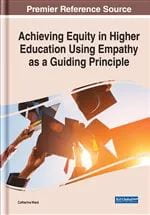 Graduate students and faculty from Kansas State University’s interdisciplinary leadership communication doctoral program contributed chapters to a newly released edited book Achieving Equity in Higher Education Using Empathy as a Guiding Principle. This book explores what empathy is, how empathy can be developed, and how administrators, practitioners, academicians, scholars, researchers, instructors, and students can apply empathy to be more equity-minded and achieve equitable outcomes.
Graduate students and faculty from Kansas State University’s interdisciplinary leadership communication doctoral program contributed chapters to a newly released edited book Achieving Equity in Higher Education Using Empathy as a Guiding Principle. This book explores what empathy is, how empathy can be developed, and how administrators, practitioners, academicians, scholars, researchers, instructors, and students can apply empathy to be more equity-minded and achieve equitable outcomes.
K-State contributors co-authored the following chapters:
Beyond Perspective Taking: Fostering Equity Through Critical Empathy and Intercultural Listening
- Aliah Mestrovich Seay, Youth Development Specialist for Community Vitality, 4-H Youth Development, K-State Research and Extension; doctoral candidate in leadership communication
- Mac Benavides, graduate teaching assistant, Staley School of Leadership Studies; doctoral candidate in leadership communication
- Sean Eddington, assistant professor, Communication Studies
- Jurdene Coleman, director of therapy and recovery services, Pawnee Mental Health Services; doctoral student in leadership communication
One way to foster equity is through intercultural listening, which can provide a unique opportunity to increase intercultural awareness by engaging in the practice of empathy. This chapter examines social justice work as educators interrogate how to deepen our commitment to deeply value diverse perspectives as we prepare students to navigate major academic milestones while emphasizing the promotion of cross-cultural communication. The authors present a conceptual framework for developing critical empathy and its application to higher education.
Empathetic Leadership: Framing, Guiding, and Connecting in Higher Education
- Andrew Wefald, associate professor, Staley School of Leadership Studies.
- Jessica Henault, Sexual & Relationship Violence Prevention Specialist, Center for Advocacy, Response and Education
This chapter explores the benefits and barriers to making higher education more empathetic and the connections between empathy and leadership. Personal, environmental, and institutional barriers that prevent students and educators from fully engaging in empathetic leadership are discussed. Effective interventions to disrupt and reduce empathy barriers are shared, utilizing social justice frameworks, along with future implications.
These scholarly contributions demonstrate how K-State’s Leadership Communication faculty and students are co-creating knowledge that enriches scholarship, research, and the common good.
This book was edited by Catherine Ward, California State University, and published by IGI Global. The book is available for pre-order here. To learn more about the leadership communication doctoral program, visit www.k-state.edu/lead-comm.
K-State research suggests probiotics may pose risks to animal, human health
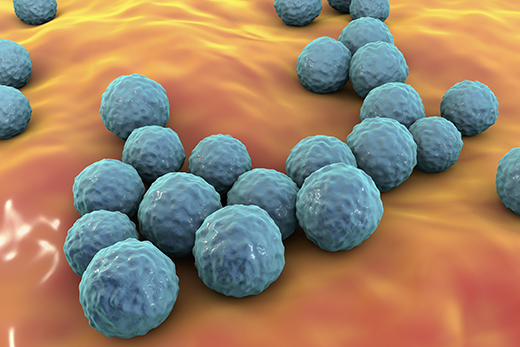 A Kansas State University team finds that a species of bacteria, Enterococcus faecium, can be a source of antibiotic resistance. Enterococcus faecium, pictured above, is contained in several commercial probiotic products for swine and cattle.
A Kansas State University team finds that a species of bacteria, Enterococcus faecium, can be a source of antibiotic resistance. Enterococcus faecium, pictured above, is contained in several commercial probiotic products for swine and cattle.
New research at Kansas State University reveals how probiotics may not be as beneficial for animal and human health as thought.
Probiotics, in most uses, are organisms considered to be beneficial for gut health in animals and humans.
Raghavendra Amachawadi, assistant professor of food animal therapeutics in the K-State College of Veterinary Medicine, and his team have discovered that a species of bacteria, Enterococcus faecium, which is contained in several commercial products for swine and cattle, can be a source of antibiotic resistance.
Their study, "Whole genome sequence analyses-based assessment of virulence potential and antimicrobial susceptibilities and resistance of Enterococcus faecium strains isolated from commercial swine and cattle probiotic products," was published recently in the Journal of Animal Science.
"Although probiotics are beneficial bacteria, some bacterial species can have unintended negative consequences," Amachawadi said. "Our research has shown that Enterococcus faecium carries genes that confer resistance to antibiotics widely used in human medicine. Feeding such products to animals raises the possibility that the genes can be transferred to pathogenic bacteria and make them resistant to antibiotics, which can be passed on to humans."
At this stage, Amachawadi said, this is only a theoretical possibility and there is no evidence of such transfer actually taking place in the gut and subsequent human exposure.
The objective of the study was to utilize whole genome sequence-based analysis to assess virulence potential, detect antimicrobial resistance genes, and analyze phylogenetic relationships of E. faecium strains from commercial swine and cattle probiotics.
"Because use of antibiotics creates resistance in bacteria, which is a huge public health concern, producers are seeking replacements for antibiotics," Amachawadi said. "Most commercial probiotic products contain live bacteria that benefit the animal by improving the gut bacterial balance."
The findings from this study suggest that, in the future, probiotic products may need to undergo a test for antimicrobial resistance genes before they are marketed for use in food animals.
The study, funded in part by a grant from the National Pork Board, included researchers from the animal sciences and industry and diagnostic medicine and pathobiology departments at K-State, as well as the Center for Food Safety and Applied Nutrition division of the U.S. Food and Drug Administration at Laurel, Maryland.
K-State Student News
Classy Cats earn national championship title at the College Classic National Invitational
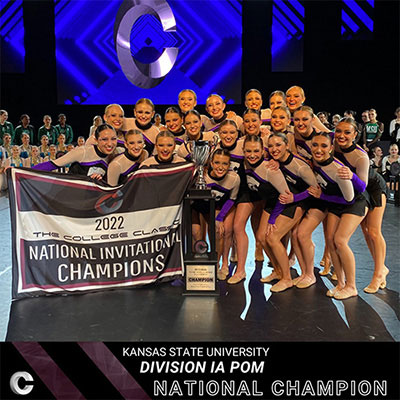 This weekend the Kansas State University Classy Cats earned the title of D1A National Champions at the College Classic National Invitational in Orlando, Florida, for pom routine. The group also earned fourth place in the D1A jazz dance category.
This weekend the Kansas State University Classy Cats earned the title of D1A National Champions at the College Classic National Invitational in Orlando, Florida, for pom routine. The group also earned fourth place in the D1A jazz dance category.
More than 60 schools participated in the College Classic National Invitational, which puts on this event every year to showcase the skill and dedication of collegiate dance teams from across the U.S.
The team is coached by Sara Heptig-Evans, a 2004 graduate of Kansas State University.
K-State biochemistry student presents cancer research at national meeting
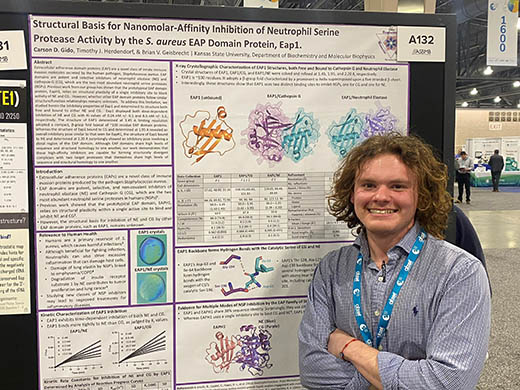 Kansas State University undergraduate Carson Gido at the annual meeting of the American Society for Biochemistry and Molecular Biology in Philadelphia. Gido was selected to present his cancer research at the meeting.
Kansas State University undergraduate Carson Gido at the annual meeting of the American Society for Biochemistry and Molecular Biology in Philadelphia. Gido was selected to present his cancer research at the meeting.
A Kansas State University student has presented his cancer research at a national meeting attended by some of the most respected scientists in his field.
Carson Gido, junior in biochemistry and molecular biophysics, Manhattan, gave the poster presentation "Structural Basis for Nanomolar-Affinity Inhibition of Neutrophil Serine Protease Activity by the S. aureus EAP Domain Protein, Eap1" at the American Society for Biochemistry and Molecular Biology Annual Meeting April 2-5 in Philadelphia.
Gido also was selected to present his research at Undergraduate Research Days. The virtual event, in early March, showcased some of the best undergraduate research being conducted at four-year public universities in Kansas.
"It felt good to be selected," Gido said. "I had been looking for an opportunity to share what we do."
Gido works with Brian Geisbrecht, professor of biochemistry and molecular biophysics, studying a white blood cell enzyme that, when over-activated, can cause lung cancer and other lung diseases.
According to Gido, the enzyme, called neutrophil elastase, can be inhibited, or blocked, by a molecule produced by the bacterium Staphylococcus aureus. The bacterial molecule, called Eap1, binds to neutrophil elastase. The research team has solved the structure of the molecules bound to one another.
"The molecules are sub-microscopic and therefore difficult to see and study," Gido said. "So, we use a technique called X-ray crystallography, where we isolate them, form them into a crystal and then do experiments that determine their structure and how they interact with each other."
Gido said the researchers hope their work will inspire ideas for designing a drug that inhibits neutrophil elastase and reduces tumor proliferation.
Gido's research experience and travel to the meeting were supported by the university's Johnson Cancer Research Center. Gido is the recipient of an Undergraduate Cancer Research Award from the center.
"I'm really grateful for the center's support," Gido said. "The meeting was such a great experience for me. In addition to presenting the research I've worked hard on, I got to network with well-known scientists and see other research presentations and what other students around the country are doing."
Gido plans to do a laboratory internship in the fall and graduate from K-State in spring 2023. Beyond that, he wants to earn a doctoral degree, possibly in biochemistry or molecular engineering, and lead a laboratory someday.
The Johnson Cancer Research Center supports and advances cancer research at Kansas State University. The center's Undergraduate Cancer Research Award program provides faculty-mentored research training and monetary support. Its award programs are funded through private donations.